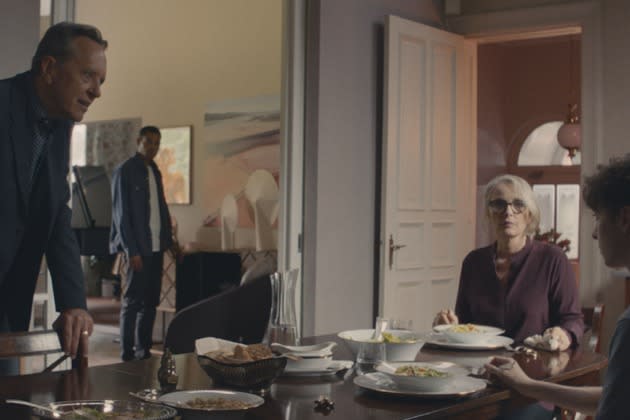‘The Lesson’ Review: Richard E. Grant and Julie Delpy Are in Top Form in an Exquisite Sun-Drenched Noir
- Oops!Something went wrong.Please try again later.
- Oops!Something went wrong.Please try again later.
- Oops!Something went wrong.Please try again later.

Alice Troughton’s first feature is a jewel, an exquisitely made chamber piece with Richard E. Grant as J.M. Sinclair, an acclaimed novelist on his way down, Julie Delpy as Helene, his art-curator wife, and Daryl McCormack as Liam, a would-be novelist who idolizes Sinclair. With a clever script that keeps us off guard, the setting of a gracious country estate whose sumptuous visuals mask a dark undercurrent, and a score that entices us into an increasingly unsettling world, The Lesson is a small delight.
The opening scene makes it seem as if we can see the film’s whole trajectory. Liam is being interviewed about his first novel, whose plot about a great patriarchal writer is obviously based on Sinclair. The narrative then flashes back to the beginning of the story, when Liam is hired to tutor the Sinclairs’ son, Bertie (Stephen McMillan), for his entrance exams to Oxford University. Alex MacKeith’s screenplay is full of twists, though, and we soon see that all three of the main characters are thoroughly manipulative.
More from The Hollywood Reporter
Liam is writing a thesis on Sinclair, which Sinclair doesn’t know about. Helene knows but hired him anyway. Whether that is because of or despite his secret agenda is something she keeps to herself for much of the film. Sinclair himself is a roaring ego of a man, given to pompous pronouncements in interviews, such as “Good writers borrow, great writers steal,” a variation on a line most often attributed to Picasso, sometimes to T.S. Eliot or others. Thief that he is, Sinclair never bothers to suggest he has pilfered the line. Literary theft is just the most obvious element of the mystery that slowly comes into play.
When Liam arrives at the Sinclairs’, we settle into a world of ease and luxury, a great light-filled house with rolling lawns and a faithful butler (Crispin Letts) — a Downton Abbey without the aristocrats or money problems. It is the idealized image of a modernized English country house; you wouldn’t guess that the actual location was in Hamburg. There is even a lake on the grounds, but that is where the Sinclairs’ older son drowned himself, the first clue to the story’s tragic undertow.
Seth Turner’s production design fills the house with contemporary art, reflecting Helene’s career. Anna Patarakina’s cinematography creates a warm, inviting glow, a sunny surface that makes the world look irresistible even as we realize how deceptive that appearance might be. And Isobel Waller-Bridge’s score is beautifully in line with the idea of a surface that prettifies the truth. Her waltzing, lyrical melodies first suggest formality and security, but eventually they change just enough to sound ominous.
It doesn’t take long for the conflicts to set in, although in true well-bred fashion they are cloaked in enigmatic smiles. The actors are as wily as the script, gradually letting us see their characters’ true natures. Much of the film focuses on Liam. McCormack, who has made strong impressions already in Good Luck to You, Leo Grande and Bad Sisters, creates another charismatic figure here. Liam is sympathetic in some ways, dressed in a tee-shirt when he might have known better in this household, struggling to catch up to the classical music references the family so naturally toss around at dinner. But he is also a voyeur and definitely up to something as he circles around his literary hero. We don’t even know if he can write. He works on a novel that he wants Sinclair to read, in longhand in a bound notebook from start to finish, apparently without any revisions. Who writes like that?
Sinclair works on a computer, with a printer and backup that don’t function as well as they should, leading him to enlist Liam’s tech help. Sinclair is so self-absorbed, so hard on his son and so dismissive of his wife, that we suspect he has some secret agenda of his own, especially when he asks Liam to take a look at his latest work and agrees to read Liam’s in exchange.
Grant can make the slimiest people seem likeable, though. And in the last stretch of the film, he makes the most of his big, explosive scenes. Of course Sinclair doesn’t want an honest criticism of his work from the unpublished writer. His cruel reaction is telling, chilling and sets off the events that unveil what might have been happening all along. Grant lets us see both the magnitude of Sinclair’s ego and the depths of his grief.
Throughout, Delpy makes Helene a serene presence, saddened by grief for her older son, concerned for Bertie, yet also a sexual magnet for both her husband and the tutor. She glides through the estate with a beatific smile, another illusory touch.
Troughton, who has directed for British television, brings a tone of supreme self-assurance to the film, expertly guiding its twists and darkening turns. And she drops in a few witty touches, including a scene in which the 1956 noir movie Yield to the Night plays in the background of a conversation and the camera closes in on a woman with a gun. Clue or red herring or neither?
Under its elegant surface, The Lesson takes on heavy issues of art, inspiration, classism, sexism, betrayal and revenge in one beautiful, impressive little package.
Best of The Hollywood Reporter
Natalie Portman at Cannes: "I Need to Leave the Drama for the Screen"
Ailing ‘Superman’ Star Valerie Perrine Finally Finds Her Hero: "The Guy Should Be Sainted"

